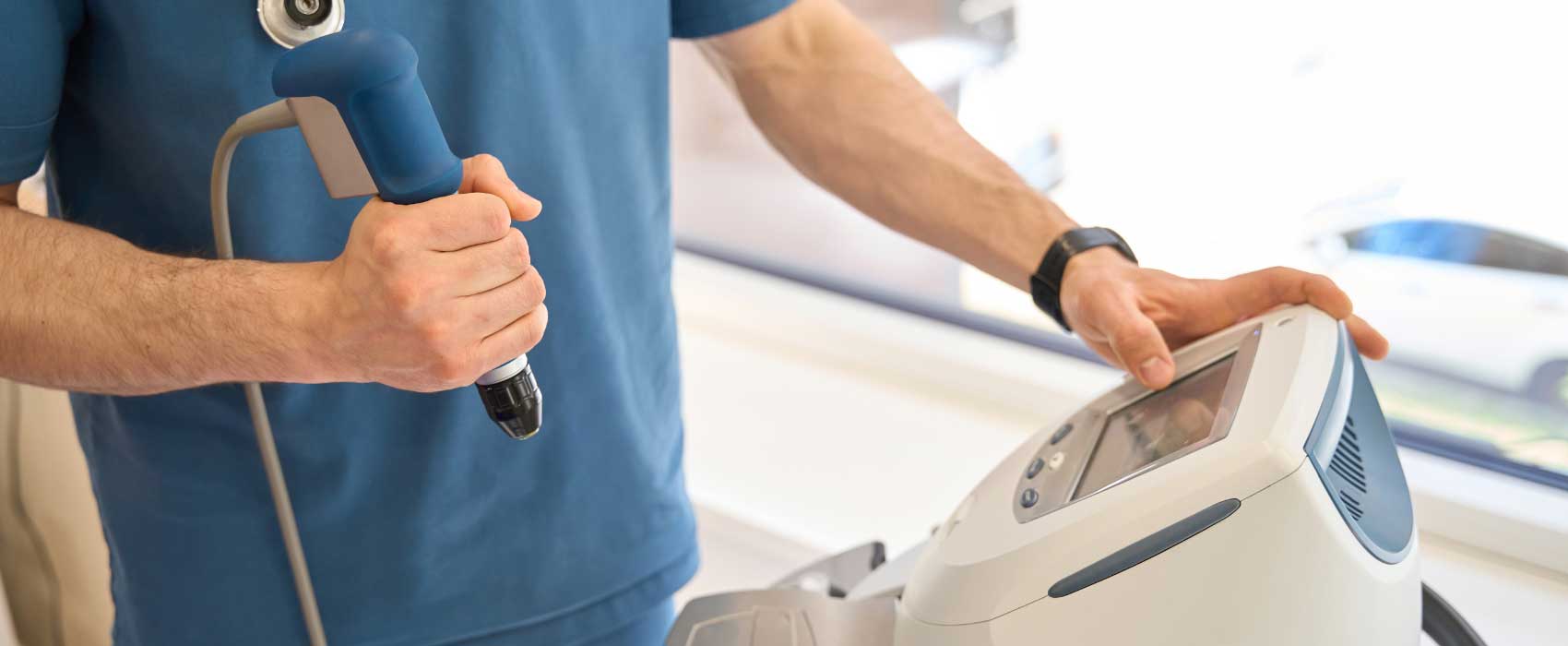
There are over 322 million men who have experienced or continue to experience erectile dysfunction around the world. Although it sounds cliche, it's common and can happen to anyone. While there are several treatment options, new procedures are continually being studied and tested to look for more permanent solutions. One of these is low-intensity shockwave therapy. Here, we aim to answer the question: does shockwave therapy for erectile dysfunction work?
Understanding Erectile Dysfunction (ED)
Erectile dysfunction (ED), commonly known as impotence, is the inability to achieve or maintain an erection sufficient for satisfactory sexual performance. It's a condition that can affect men of all ages, but it becomes increasingly common as men age. While occasional difficulty in getting or keeping an erection can be normal, frequent or ongoing issues may indicate ED and can lead to emotional distress, strained relationships, and a decrease in self-confidence.
ED can be caused by both physical and psychological factors, with some of the common being:
- Cardiovascular disease
- Diabetes
- Obesity
- High blood pressure
- High cholesterol
- Low testosterone
- Hormonal imbalances
- Stress
- Anxiety
- Depression
- Relationship problems
- Smoking
- Excessive alcohol use
- Sedentary lifestyles
Traditional Treatment for Erectile Dysfunction
There are several treatment options to address erectile dysfunction symptoms and help support a healthy sex life. Many doctors will recommend a combination of lifestyle changes, medication, therapy, and, in some cases, surgical intervention. Some of the most common treatments for ED include the following:
- Exercise: Regular physical activity can improve blood flow, reduce stress, and help manage conditions like obesity and diabetes linked to ED.
- Diet: A heart-healthy diet rich in fruits, vegetables, whole grains, and lean proteins can improve cardiovascular health and reduce the risk of ED.
- Quitting Smoking: Smoking can damage blood vessels and restrict blood flow to the penis, making it difficult to achieve an erection.
- Reducing Alcohol Consumption: Excessive drinking can impair sexual function and decrease libido.
- Managing Stress: Stress and anxiety can interfere with sexual performance, so stress management techniques like meditation, yoga, or therapy can be beneficial.
- Phosphodiesterase type 5 (PDE5) Inhibitors: Medications like sildenafil (Viagra), tadalafil (Cialis), and vardenafil (Levitra) are often the first line of treatment. They work by increasing blood flow to the penis, making it easier to achieve and maintain an erection.
- Hormone Therapy: For men with low testosterone levels, hormone replacement therapy may be recommended to boost libido and improve erectile function.
- Injection Therapy: Medications such as alprostadil can be injected directly into the penis or inserted as a pellet into the urethra to stimulate an erection.
- Sex Therapy: Focuses on improving sexual communication between partners and addressing any sexual dysfunction.
- Cognitive-Behavioral Therapy (CBT): Helps manage anxiety, depression, and other mental health issues that may be contributing to ED.
- Couples Counseling: Can help partners navigate the emotional and relational aspects of ED.
- Penile Implants: Penile implants are devices surgically placed inside the penis that allow a man to control when and how long he has an erection.
- Vascular Surgery: In rare cases, surgery to repair or bypass blocked blood vessels in the penis may be recommended.
What is Low-Intensity Shockwave Therapy (LiSWT)?
Low-intensity shockwave therapy (LiSWT) is a non-invasive treatment used in the medical industry for several years. It's typically used to help heal injured ligaments, tendons, and even bones. It's been shown to support wound healing and enhance overall tissue repair and cell growth.
LiSWT is administered using a wand-like device that emits gentle pulses and sound waves that create micro-injuries within the penile tissue. This can help improve blood flow and remodel tissues that may contribute to an individual's ability to get or maintain an erection. Shockwave therapy isn't usually painful, and treatment sessions may last as short as 15 minutes.
It's important to know that while low-intensity extracorporeal shockwave therapy has shown promising results for some, it's currently not approved by the Food and Drug Administration (FDA). The American Urological Association (AUA) also suggests that patients with erectile dysfunction only receive this treatment in approved clinical trials.
Sometimes, another treatment called radial wave therapy is advertised as a type of shockwave therapy to treat ED. Radial wave therapy is not the same as applying a low-intensity shock wave to the penis. Radial wave therapy is a treatment that is ineffective at addressing erectile dysfunction. It essentially delivers vibrations but not shock waves, so while blood flow may be temporarily higher due to stimulation, it's not a lasting solution.
How Long Does Shockwave Therapy Take to Treat Erectile Dysfunction?
Randomized controlled trials found that shockwave therapy helps individuals most when they follow a treatment plan going twice weekly for three weeks, followed by three weeks without treatments, then three weeks of twice-weekly treatments. If you're a candidate for shockwave therapy, it's important to talk with your urologist about realistic expectations about the formation of new blood vessels to support erectile function. People who get shockwave therapy successfully may only experience increased blood flow to the penis for up to a year before having to repeat the process. It is not a cure. Research conducted in 2016 found that 60% of participants who received LiSWT experienced benefits that lasted up to 12 months.
Risks of Shockwave Treatment for ED
Although no side effects have been recorded from individuals who've received LiSWT in clinical trials, it's still a new procedure. Long-term complications may still appear, so if you've received shockwave therapy and notice anything, it's important to talk to your urologist.
Due to the increasing popularity of shockwave therapy as a treatment option for ED, it's also important to do your research. Several clinics or businesses offer this service that are not urologists or physicians. If you're interested in whether or not shockwave therapy may be good for you, start by talking to your urologist. It's important to partner with an experienced professional for shockwave therapy to be effective and administered safely.
Similarly, avoid products that claim to be effective "in-home" shockwave therapy. These tend to use radial therapy rather than the legitimate shockwave therapy procedure offered by urologists. Plus, it's important to rule out underlying conditions that often contribute to ED, such as cardiovascular disease, before trying experimental treatments.
Who Can Get Shockwave Therapy for ED Treatment?
Shockwave therapy also seems to work best for individuals who have vasculogenic erectile dysfunction, which is a type of ED that is caused by issues with the blood vessels in the penis. The effectiveness of increasing blood flow for other causes of ED is not as well studied or known. Some clinical studies have also found that individuals with mild to moderate ED, but results may be due to underlying health conditions getting better. Other studies showed better results for individuals with moderate to severe ED, so the research is still quite skewed.
Is Shockwave Therapy Covered by Insurance?
Since shockwave therapy for the treatment of erectile dysfunction is not approved by the FDA, most insurance providers will not cover the costs. This can make the treatment quite expensive, especially since you usually need multiple sessions to encourage the growth of new blood vessels. Typically, each session is an average of about $450, which can cause a twice-weekly regimen to cost up to $2,700.
Although LiSWT is a new ED treatment that has been gaining traction, it's still only recommended for clinical use. If it isn't available in your area, your doctor can recommend plenty of traditional ED treatments.
If you experience ED, talk to your doctor to learn more about the treatment options available. To help you address other urologic conditions, Byram Healthcare offers a wide selection of high-quality urologic supplies that can be discreetly delivered to your door. For more information, contact one of our representatives today.




